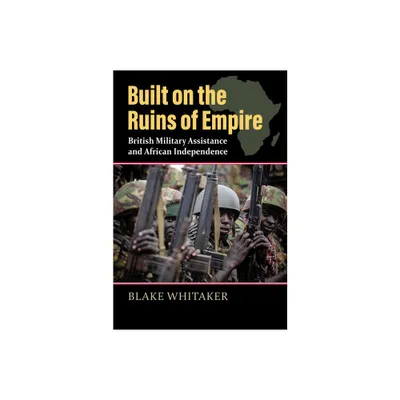Home
Built on the Ruins of Empire: British Military Assistance and African Independence
Loading Inventory...
Barnes and Noble
Built on the Ruins of Empire: British Military Assistance and African Independence
Current price: $49.99


Barnes and Noble
Built on the Ruins of Empire: British Military Assistance and African Independence
Current price: $49.99
Loading Inventory...
Size: Hardcover
*Product Information may vary - to confirm product availability, pricing, and additional information please contact Barnes and Noble
During the Cold War the British government oversaw the transition to independence of dozens of colonies. Often the most challenging aspect of this transition was the creation of a national army from colonial forces. In
Built on the Ruins of Empire
, Blake Whitaker examines this process in Kenya and Zambia and how it set the course for the creation of the army in Zimbabwe. He also looks at three themes as they intersect in African military history: British decolonization, race relations, and the Cold War.
While the transition to independence was a difficult process in places such as Ghana and Nigeria, it was compounded by the racial tensions in Kenya, Zambia, and Zimbabwe. All three were settler colonies home to a sizable community of white Europeans who controlled the levers of power and economic prosperity.
focuses on the difficulties that arose in creating a cohesive and apolitical military force in these racially charged Cold War environments and demonstrates that the challenges faced by the British training missions in Kenya and Zambia taught London important lessons about the emerging postcolonial world.
Whitaker uniquely analyzes the successes and failures of the British military assistance programs and their quest to solidify British influence while examining how Britain’s position and influence in the wider world was fading just as Zimbabwe was achieving independence.
Built on the Ruins of Empire
, Blake Whitaker examines this process in Kenya and Zambia and how it set the course for the creation of the army in Zimbabwe. He also looks at three themes as they intersect in African military history: British decolonization, race relations, and the Cold War.
While the transition to independence was a difficult process in places such as Ghana and Nigeria, it was compounded by the racial tensions in Kenya, Zambia, and Zimbabwe. All three were settler colonies home to a sizable community of white Europeans who controlled the levers of power and economic prosperity.
focuses on the difficulties that arose in creating a cohesive and apolitical military force in these racially charged Cold War environments and demonstrates that the challenges faced by the British training missions in Kenya and Zambia taught London important lessons about the emerging postcolonial world.
Whitaker uniquely analyzes the successes and failures of the British military assistance programs and their quest to solidify British influence while examining how Britain’s position and influence in the wider world was fading just as Zimbabwe was achieving independence.


















